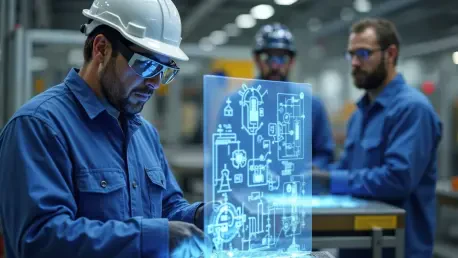Imagine stepping into a cutting-edge manufacturing facility ready to embrace the Industrial Internet of Things (IIoT) revolution, only for operations to falter, not due to lack of vision, but a scarcity of skilled hands to build that vision. This reality is imminent, with industries forecasted to face a skills shortage so profound that nearly 2 million jobs risk remaining unfilled within the next decade.
Understanding the Current Challenge
The modern manufacturing landscape is under pressure. The Industrial IoT holds the promise of extraordinary economic growth, yet this potential remains largely untapped due to the multifaceted nature of skills required. The convergence of hardware engineering, data analytics, cybersecurity, and more demands a workforce prepared to tackle these intertwined domains. Moreover, with numerous sectors competing for the same skilled personnel, manufacturing risks being left behind in the race to hire technological talent.
Strategies to Enhance Skills
To combat this significant obstacle, companies are pursuing innovative strategies. One avenue involves partnering with educational institutions—ranging from high schools to universities—to cultivate interest in industrial careers from an early age. Reframing the image of manufacturing as a hub of technological advancement rather than outdated practices can draw new, tech-savvy minds. Furthermore, investment in current employees through structured upskilling programs can create a dynamic, adaptable workforce ready to meet the demands of IIoT.
Enhancing operational efficiency through strategic IoT integration also presents a viable solution. By carefully selecting technologies that complement rather than replace human labor, organizations can maintain optimal operation flow while minimizing the dependency on an additional workforce. Moreover, leveraging advanced learning technologies such as augmented reality and gamification can improve the learning experience, making it more engaging and effective.
Insights from Industry Leaders
Industry thought leaders highlight that evolving workforce models are not just about hiring new talent but innovating with what organizations already possess. Successful anecdotes of IoT integration reveal transformative effects on employee morale, shifting workplace culture towards more interactive and collaborative forms. Companies such as the Spanish manufacturer Campofrio have shown that with proper training and development, employees can transition seamlessly into tech-enhanced roles, elevating performance and fostering a positive work environment.
Implementing Effective Solutions
As industries strive to bridge the skills gap, implementing smart solutions becomes essential. Actionable frameworks prioritize smart recruitment practices, seamlessly integrating new technologies to optimize human collaboration. Training methods that facilitate knowledge retention and enable scalability are critical, as is creating an organizational culture that supports continuous growth and learning.
Cultivating a growth mindset is paramount. Organizations are encouraged to foster environments where technology enhances rather than replaces the workforce, preparing teams not just for present challenges but for future opportunities. By promoting knowledge sharing and curiosity, companies can transform workforce limitations into strengths, reinforcing their competitive edge in evolving industrial ecosystems.
The industrial skills challenge highlights an urgent need for systemic adaptation. Manufacturing must balance urgent labor demands with long-term strategic growth. Through proactive adoption of smart solutions, nurturing human capital, and embracing tech-led learning advancements, industries gradually narrow the skills gap. This transition not only stabilizes the sector but unlocks new avenues for innovation and competitiveness, propelling manufacturing into a sustainable future driven by technology and human ingenuity.









